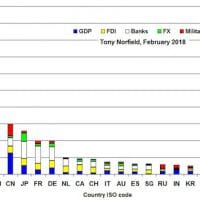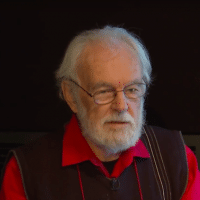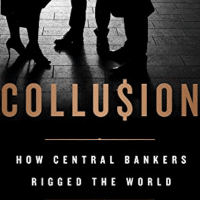-
Index of power
he overall picture shows a small number of countries, led by the U.S., towering over the rest. Only 33 countries out of 180 have an index that is more than 1% of the U.S. index number! In the chart, the columns for these would look like the x-axis, so I have shown just the top 20 countries. Of those, only five are close to or above 20% of the U.S. number: the UK, China, Japan, France and Germany.
-
Not a matter of if, but when
The capitalist crisis will deepen as new bubbles created by easy money begin to burst.
-
What does China’s ‘ecological civilization’ mean for humanity’s future?
Imagine a newly elected president of the United States calling in his inaugural speech for an “ecological civilization” that ensures “harmony between human and nature.” Now imagine he goes on to declare that “we, as human beings, must respect nature, follow its ways, and protect it” and that his administration will “encourage simple, moderate, green, and low-carbon ways of life, and oppose extravagance and excessive consumption.”
-
Introduction to the material constitution
In a couple of previous posts on Legal Form, Rob Hunter has reminded us of the importance and aptness of a Marxist approach to the analysis of public law. Hunter’s intervention could not be more timely: even after the economic and financial crisis, and despite the comeback of Marxism as a relevant intellectual source at least within certain legal domains (think, for example, of international law) [1], there has not yet been a Marxist revival in constitutional studies. One possible explanation for this phenomenon (though likely not the only one) is the discredit and almost total obliteration of the best-known Marxist contribution to constitutional studies: Lassalle’s notion of the material constitution.
-
Marx for the 21st century with David Harvey
Marx’s ‘Capital’ is one of the most important texts of the modern era and continues to resonate today. Professor David Harvey, the world’s leading expert on Karl Marx, explains the continued importance of Marx’s analysis and how we can apply it to today’s economy and society.
-
The African Anthropocene
Every year, human activity moves more sediment and rock than all natural processes combined, including erosion and rivers. This might not shock you. In fact, you’ve probably seen similar soundbites circulating online, signals of the sheer scale of how we’re terraforming the planet in the era of the Anthropocene. Natural and social scientists argue passionately about almost everything Anthropocenic, from the nuances of nomenclature to the start-date of the new geological epoch, but most agree on one thing: the Earth will outlive humanity. What’s in doubt is how long we will populate the planet, and under what conditions.
-
Trump sycophants explain the stock market drop
Friday and Monday the stock market took a huge drop and Trump’s opponents went a little mental over it. That’s really not very interesting, stock markets drop from time to time for all kinds of reasons. What makes it in any way relevant is that Trump continually claims credit for the market having gone up since he took office, even though it’s gone up steadily for almost a decade now. And that means Trump’s sycophants have to find some explanation for it. Let the fun begin with Sean Hannity, who of course blames it on Obama:
-
NYT joins campaign to purge the term, “white monopoly capital” in South Africa
The New York Times, the world’s premier journalistic purveyor of a “fake,” imperial, and profoundly white capitalist world view — masquerading as all the news that’s fit to print — wants us to believe that a now-bankrupt London-based public relations firm is behind South Africa’s regime-shaking debate over the rule of “white monopoly capital.”
-
Trump’s new dark money man takes over
During her last news conference in December, Janet Yellen stood firm on her record stating, “The global economy is doing well. We’re in a synchronized expansion. This is the first time in many years that we’ve seen this.”
-
World stock market turmoil – prepare for a rough ride
Despite all the euphoria in the past period about the world recovery and booming stock markets, events have taken a sharp turn for the worse. Over the past week, stock markets around the world have plunged.
-
What goes up…
Take the stock market, for example. Last Friday, the Dow Jones Industrial Average closed down 666 points, or 2.5 percent, its biggest percentage decline since the Brexit turmoil in June 2016 and the steepest point decline since the 2008 financial crisis.
-
Tomgram: Nomi Prins, how to set the economy on fire
There’s no way to measure just how cheery this period really is — not if you’re the CEO of a major company. Just as the World Economic Summit was opening in Davos, Switzerland, and President Donald Trump was flying in to put his mark on the moment, PwS, a global consulting firm, released its annual survey of 1,300 CEOs.
-
Signs of economic trouble ahead
The current expansion has gone on for 102 months. Only the expansions from March 1991 to March 2001 (120 months) and from February 1961 to December 1969 (106 months) are longer. Unfortunately, growth during this expansion has been slow and the gains have largely gone to a very few. And there are signs of economic trouble ahead.
-
Trump wants $716 Billion by 2019 to pursue “aggressive defense” against China
As if to highlight the American government’s real position on world peace, and Trump’s true position on Russia, just as peace talks between North and South Koreas are reaching their zenith (peace talks that occurred just as the North developed a ballistic missile that can deliver a nuclear payload to the U.S., and the promise of Mutually Assured Destruction- a coincidence, surely) it seems Trump is getting ready to ask for a sharp increase for the 2019 US defense budget.
-
Amazon is a 21st-century digital chain gang
When Amazon announced plans to locate a $5 billion, 50,000-employee complex as its second headquarters somewhere in North America, state governments and municipalities fell over themselves offering billions of dollars in tax abatements and corporate subsidies to secure the prize.
-
How should socialists understand finance: remembering the lessons of Capital
For those on the Left, finance seems like a bourgeois pastime. Many of us outright despise the stuff. While the petit bourgeoisie drool over dividends and diversification, we prefer to focus on crisis and class.
-
Value, credit and crisis: Reading Marx out of context can lead to confusion
A literalist, out-of-context reading of Marx can get one into trouble, or at the very least, leave you hopelessly confused. For help, I look to David Harvey. Perhaps the preeminent expert on Marx’s Capital in the English-speaking world, Harvey meticulously reconstructed Marx’s approach to money in his major treatise, Limits to Capital (1982).
-
GROKO or NO GROKO?
It happened in Bonn last Sunday, on January 21st. There were close to 650 delegates, the gallery in the congress hall was also packed with observers. The suspense was almost visible, also among the demonstrators outside. All over Germany millions were watching closely to see if the future path of the Social Democratic Party (SPD), […]
-
Warren Buffett & imperial economics
Warren Buffett is one of the wealthiest people in the world. He is also Chairman of the Board, President and Chief Executive Officer of Berkshire Hathaway, a huge U.S. investment conglomerate. Looking at Berkshire’s investment policy reveals some important features of the economics of imperialism today and the role of money capitalists.
-
Dutiful dirges of Davos
Thousands of people will gather next week in Davos. Their combined wealth will reach several hundred billion dollars, perhaps even close to a trillion. Never in world history will be the amount of wealth per square foot so high. And this year, for the sixth or seventh consecutive time, what would be one of the principal topics addressed by these captains of industry, billionaires, employers of thousands of people across the four corners of the globe: inequality…




















